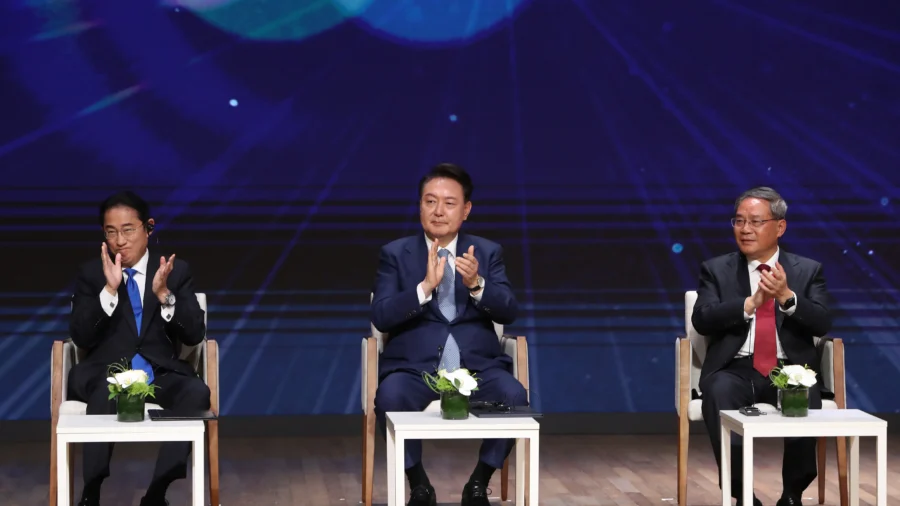China, Japan, and South Korea have agreed to increase cooperation after leaders of the three Asian neighbors held their first summit in more than four years in Seoul.
Chinese Premier Li Qiang, South Korean President Yoon Suk Yeol, and Japanese Prime Minister Fumio Kishida agreed to “institutionalize” the three countries’ cooperation through holding regular high-level trilateral meetings and ministers’ summits, according to a joint statement issued after a three-way talk on Monday.
They also issued separate agreements for cooperation on intellectual property and future pandemic prevention.
Speaking at a joint conference following the meeting, Mr. Yoon expressed his hope of swiftly resuming free trade agreement negotiations between the three countries, which have been suspended since 2019.
Mr. Kishida said the three countries share a big responsibility for regional peace and that Japan will chair the next round of the trilateral leaders’ meeting.
In 2008, leaders of the three economies, which account for about a quarter of the world’s gross domestic product, agreed to convene a meeting annually. However, the meetings stalled after the last one in December 2019 in the southern Chinese city of Chengdu because of the COVID-19 pandemic and the complex ties between the three countries.
As for China’s side, Mr. Li said the regime wants to cooperate with South Korea and Japan in economic and technological areas, especially on supply chains and cutting-edge areas such as artificial intelligence.
The three-way meetings took place as the Chinese regime faced growing U.S.-led international pressure over issues ranging from its massive state subsidies to revive the flattering economy to the sovereign claims of a self-ruled Taiwan. Tensions across the Taiwan Strait heightened last week as the CCP staged large-scale exercises in the sea and air spaces around Taiwan, a democratic-governed that saw its new president, Lai Ching-te, sworn in.
The summit was also overshadowed by the nuclear threat from North Korea. Just hours ahead of the three-way meetings, the Kim Jong Un regime notified Japan of its plan to fire a rocket to send a second military spy satellite into orbit.
In light of the growing threats posed by the CCP and its close ally in Pyongyang. Japan and South Korea have put aside their historical divisions and strengthened their determination to deepen security and economic cooperation.
Against this backdrop, analysts signaled low expectations for any significant improvement in the relationship among the three Asian neighbors despite Bejing’s efforts to bring Seoul and Tokyo closer.
“China is seeking to mend diplomatic ties with South Korea and Japan, and the summit provides a good opportunity. However, the eventual results of the engagements will be heavily influenced by China’s overarching strategy,” Chen Ping-Kuei, an expert in international relationships at Taiwan’s National Chengchi University, told The Epoch Times.
Mr. Chen said he maintains a “pessimistic outlook” regarding the potential outcomes of the CCP’s diplomatic efforts, given that the Chinese premier still complained about the two countries’ expanding partnership with Washington while calling for cooperation.
According to the summary of the three-way meeting by China’s state media Xinhua, Mr. Li urged Mr. Yoon and Mr. Kishida to avoid “turning economic and trade issues into political games or security matters” and reject “protectionism,” terms that the CCP often used to attack Washington’s efforts to counter Beijing’s overcapacity and other unfair trade policies.
Meanwhile, there is little indication that Mr. Yoon and Mr. Kishida responded to Mr. Li’s calls, according to Chen Shih-min (not related to Chen Ping-Kuei), an international security expert at the National Taiwan University in Taipei.
He believes it’s unsurprising that Japan and South Korea agreed to explore economic cooperation with China because all three countries are grappling with economic challenges.
Despite this, when it comes to crucial matters like security and supply chains, both Tokyo and Seoul are expected to bolster their ties with Washington.
“For Japan and South Korea, they will continue to prioritize and focus on enhancing their cooperation with the United States, and this trajectory, I believe, remains unchanged,” Mr. Chen Shih-min told The Epoch Times.
During a bilateral Japan-China summit on Sunday, Mr. Kishida reiterated a call to release Japanese nationals detained in China and to lift a ban on the import of Japanese seafood imposed by the CCP in August 2023.
Mr. Kishida also raised “serious concerns” about the situations in Hong Kong, Xinjiang, and the South China Sea, according to a readout issued by Mr. Kishida’s office. Regarding Taiwan, Mr. Kishida told Mr. Li that Japan is “closely monitoring relevant developments, including military activities.”
The Associated Press contributed to this report.
From The Epoch Times

